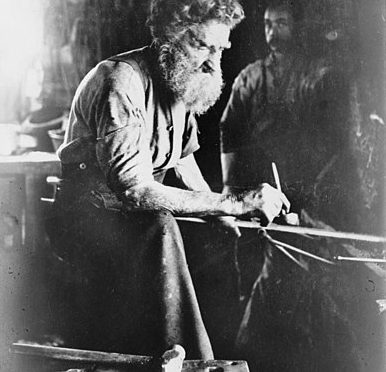My players’ characters are visiting a village smithy, so I decided the local bard will sing this poem as they approach (then ask them for money!). Since our homebrew campaign world is set in Stone Age Eurasia, I changed the references to Christ and Sunday worship to more neutral items. My edited words are in italics. (With apologies to Henry Wadsworth Longfellow.)
The Village Blacksmith
UNDER a spreading chestnut tree
The village smithy stands;
The smith, a mighty man is he,
With large and sinewy hands;
And the muscles of his brawny arms
Are strong as iron bands.
His hair is crisp, and black, and long,
His face is like the tan;
His brow is wet with honest sweat,
He earns whate’er he can,
And looks the whole world in the face,
For he owes not any man.
Day in, day out, from morn till night,
You can hear his bellows blow;
You can hear him swing his heavy sledge
With measured beat and slow,
Like a cleric ringing the village bell,
When the evening sun is low.
And children coming home from toil
Look in at the open door;
They love to see the flaming forge,
And hear the bellows roar,
And watch the burning sparks that fly
Like chaff from a threshing-floor.
He goes each tenday to the shrine,
And sits among his boys;
He hears the cleric pray and preach,
He hears his daughter’s voice,
Singing in the village choir,
And it makes his heart rejoice.
It sounds to him like her mother’s voice,
Singing in paradise!
He needs must think of her once more,
How in the grave she lies;
And with his hard, rough hand he wipes
A tear out of his eyes.
Toiling,—rejoicing,—sorrowing,
Onward through life he goes;
Each morning sees some task begin,
Each evening sees it close;
Something attempted, something done,
Has earned a night’s repose.
Thanks, thanks to thee, my worthy friend,
For the lesson thou hast taught!
Thus at the flaming forge of life
Our fortunes must be wrought;
Thus on its sounding anvil shaped
Each burning deed and thought!


